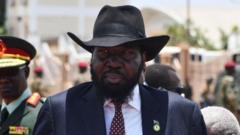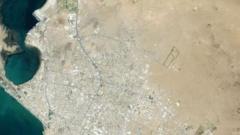South Sudan's foreign ministry has responded to the US visa ban for its citizens, asserting it was based on a misidentified national. The US Secretary of State indicated the ban would remain until South Sudan fulfills its obligations regarding deportations, highlighting ongoing tensions in the region.
South Sudan Denounces US Visa Ban Over Alleged Citizenship Error

South Sudan Denounces US Visa Ban Over Alleged Citizenship Error
South Sudan's government claims US visa restrictions stem from a misunderstanding regarding an individual's nationality.
South Sudan has criticized the recent blanket visa ban imposed by the United States, claiming it resulted from a misinterpretation of nationality concerning an individual deported from the US. The US Secretary of State Marco Rubio announced the ban, condemning South Sudan for failing to accept the return of its nationals, which has escalated tensions between the two countries.
In response, South Sudan's foreign ministry clarified that the man at the center of the controversy was a citizen of the Democratic Republic of Congo, not South Sudan, arguing that the situation arose from an isolated incident. The government emphasized that all relevant evidence has been shared with US officials, regretting the blanket measure taken against all South Sudanese nationals.
This marks the first time during the current administration that the US has enacted such sweeping restrictions based on nationality. Rubio noted the US's intention to reassess the situation once South Sudan demonstrates cooperation with repatriation efforts.
South Sudan's Information Minister, Michael Makuei Lueth, has accused the US of exaggerating the situation, stating that no sovereign nation is obliged to accept foreign deportees without due process. He indicated that the country is navigating a delicate political landscape, especially after First Vice-President Riek Machar was recently placed under house arrest, raising concerns of potential renewed civil conflict.
The situation has further worsened with the US government ordering non-emergency personnel to evacuate South Sudan amidst rising instability and the threatening of a peace agreement from 2018. In the past, South Sudanese citizens in the US were granted Temporary Protected Status (TPS), which is set to expire soon, adding to the uncertainty faced by these individuals.
In response, South Sudan's foreign ministry clarified that the man at the center of the controversy was a citizen of the Democratic Republic of Congo, not South Sudan, arguing that the situation arose from an isolated incident. The government emphasized that all relevant evidence has been shared with US officials, regretting the blanket measure taken against all South Sudanese nationals.
This marks the first time during the current administration that the US has enacted such sweeping restrictions based on nationality. Rubio noted the US's intention to reassess the situation once South Sudan demonstrates cooperation with repatriation efforts.
South Sudan's Information Minister, Michael Makuei Lueth, has accused the US of exaggerating the situation, stating that no sovereign nation is obliged to accept foreign deportees without due process. He indicated that the country is navigating a delicate political landscape, especially after First Vice-President Riek Machar was recently placed under house arrest, raising concerns of potential renewed civil conflict.
The situation has further worsened with the US government ordering non-emergency personnel to evacuate South Sudan amidst rising instability and the threatening of a peace agreement from 2018. In the past, South Sudanese citizens in the US were granted Temporary Protected Status (TPS), which is set to expire soon, adding to the uncertainty faced by these individuals.





















